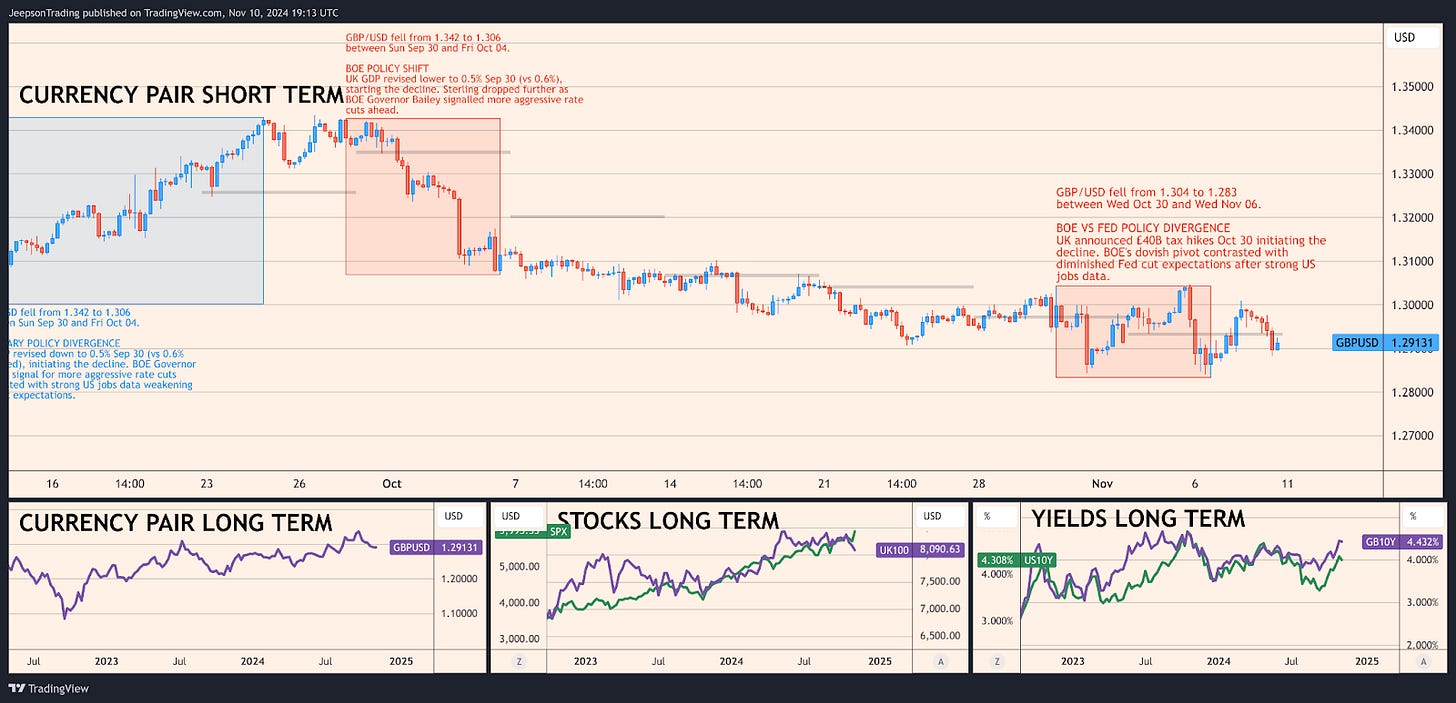Your Guide to Trading Currencies After the US Election
Monday, November 11, 2024, Week 45
The big news shaking up the markets is Donald Trump's win in the US presidential election. This, combined with recent interest rate cuts by several major central banks, means there's a lot for traders to think about. If you're trading this week, you'll want to keep an eye on inflation numbers coming out from several countries, as these could cause some big moves in the currency markets. Let's break down what's happening with each major currency pair and what it means for your trading.
British Pound vs US Dollar: UK Rate Cut Pushes Pound Lower
The British pound (GBP) is mostly traded during London and New York trading hours, when the markets are busiest. It tends to move along with UK government bond yields and the UK stock market. See the latest trade plan here.
What's happened lately? The pound fell to $1.285 last week, its lowest price since August. This happened for two main reasons. First, the Bank of England cut interest rates to 4.75%, with 8 out of 9 officials voting for the cut. Second, Trump's election win made the dollar stronger. The UK government also announced plans to raise taxes by £40 billion, which made some traders worry about the UK economy.
What could make the pound go up?
Good UK growth numbers coming out this Thursday
Higher than expected inflation numbers on November 15
Signs that the Bank of England might slow down its rate cuts
Good news about UK-US trade deals under Trump
What could make the pound go down?
Bad UK economic numbers on Thursday
Signs that the Bank of England might cut rates faster
Higher US interest rates under Trump
New trade barriers that could hurt UK businesses
Euro vs US Dollar: German Politics and ECB Rate Cut in Focus
The euro is the world's most traded currency after the US dollar. Big banks and investment funds do most of the trading. The euro usually moves in the opposite direction of the dollar - when the dollar gets stronger, the euro often gets weaker.
Last week, the euro had its biggest drop since March 2020, falling to $1.072. This happened because Trump won the election and because Germany (the biggest economy in Europe) is having some political problems. The European Central Bank also cut its interest rate to 3.25%. However, there was some good news - the European economy grew by 0.4% last quarter, which was better than expected.
What could make the euro go up?
Germany sorting out its political problems
Good inflation numbers coming out on Thursday
Signs that the European Central Bank might stop cutting rates
Better economic news from China (which helps European exports)
What could make the euro go down?
Trade fights between the US and Europe under Trump
More political problems in Germany
Bad economic numbers from Europe
Signs that the European Central Bank might cut rates again
Australian Dollar vs US Dollar: Strong Jobs Data Helps Aussie
The Australian dollar (often called the Aussie) is interesting because it's closely tied to commodity prices and China's economy. When China's economy is doing well or commodity prices are rising, the Aussie usually gets stronger. See the latest trade plan here.
The Aussie showed some strength last week, bouncing between $0.651 and $0.669 before settling at $0.657. This strength came from two pieces of good news: the Reserve Bank of Australia kept interest rates steady at 4.35% (for the eighth time in a row), and Australia added an impressive 64,100 new jobs in September. However, worries about Trump's trade policies with China kept the Aussie from going higher.
What could make the Aussie go up?
Good economic news from China
More strong job numbers in Australia
The Reserve Bank of Australia keeping rates steady
Rising commodity prices
What could make the Aussie go down?
Trade fights between the US and China
Problems in China's property market
Signs that the Reserve Bank of Australia might cut rates
General market worries making traders avoid riskier currencies
Conclusion
The currency markets are dealing with a lot of changes right now. Trump's election win and different central bank policies around the world are the main things to watch.
Three key things to remember:
Trump's win will change how countries trade with each other, which affects currencies
Different countries are moving their interest rates in different directions
Political problems, especially in Europe, could cause sudden market moves
Sources:
Bank of England, European Central Bank, Reserve Bank of Australia, Federal Reserve, Bloomberg News, Reuters, S&P Global, Trading Economics.





